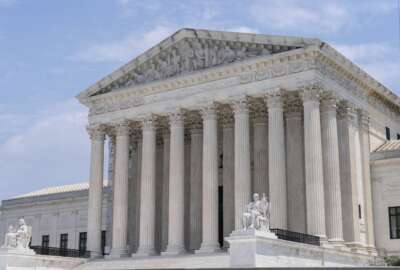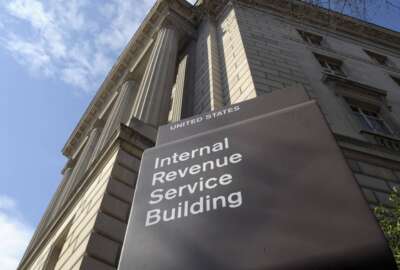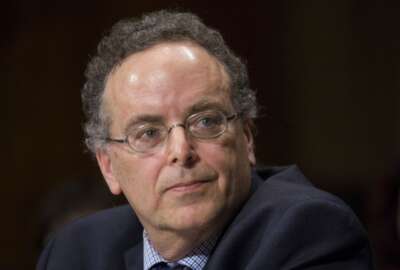Has the Supreme Court weakened the cause of whistleblowers?
A new Supreme Court ruling seems to throw a wrench into the False Claims Act, in particular the "qui tam" cases where a whistleblower stands to benefit from...
A new Supreme Court ruling seems to throw a wrench into the False Claims Act, in particular the “qui tam” cases where a whistleblower stands to benefit from revealing false claims. It gives the Justice Department greater authority to toss out certain cases. For analysis, Federal Drive with Tom Temin spoke with whistleblower attorney Steve Kohn of Kohn, Kohn Colapinto.
Interview Transcript:
Tom Temin What precisely did the court rule here? And maybe tell us a little bit about the case?
Steven Kohn Sure. So the false claims, qui tam is a unique type of law because it, lets say, whistleblower stand in for the federal government to protect the government from fraud. So the whistleblower can initiate a case and pursue a case against a fraudster, even if the federal government doesn’t get involved. It’s a historic procedure, goes all the way back to the Middle Ages. It was used extensively in the colonies, and I think the first Congress of America passed 15 of these qui tam type laws. So that’s the issue. But the issue was if the Justice Department, if the United States wants to throw the case out, what are the rights of the whistleblower? And at the bottom line, it’s government money. So the whistleblower is trying to protect the government. But what happens if the government says we don’t want that protection? We want the case dismissed? That was what was before the Supreme Court.
Tom Temin All right. And so in this case, then, it was a case where the government decided not to get involved.
Steven Kohn Exactly. The government moved to have the case dismissed and the whistleblower objected and said they just can’t walk into court and have the case thrown out. The statute gives the government the authority to do that. But there’s supposed to be a hearing. So the question is, can the judge overrule the Justice Department’s decision? What’s the purpose of the hearing? That’s what was before the court. But that’s not the issue today.
Tom Temin Well what did the court decide, though, just so we know?
Steven Kohn Sure. So the court decided that the government can have a case dismissed early on and that there’s no dispute about that. But once the government says they don’t want to participate in a case, they walk out without dismissing it. Could they come back a year later after the whistleblower has spent thousands and thousands of dollars litigating a case? Could they walk in and say toss cv the case? And what the court decided was the answer was yes, with a caveat. They applied a basic rule of civil procedure that lets a party have a case thrown out and set up some guideposts. So at the end of the day, they didn’t give the United States the complete authority to throw a case out. But if you read between the lines, the United States would be able to have dismissed almost every single case they wanted to applying the standard that the court set forth.
Tom Temin And is that standard difficult? I mean, is this good for whistleblower cases or bad for them?
Steven Kohn Well it’s interesting. It’s our view. It’s almost neutral because it very rarely comes up. I mean, this is one in 100, one in a thousand. So what was going on here? What the court had before them was a very narrow question applied to a very narrow set of cases. But that’s not what occurred.
Tom Temin All right. We’re speaking with Steven Kohn. He’s a whistleblower attorney with the firm Kohn, Kohn, Colapinto. And this was an 8 to 1 ruling, and it’s the one justice dissent by Justice Clarence Thomas that’s got you worried.
Steven Kohn Exactly. So Clarence Thomas does two things in his dissent. First, he says you can’t just throw out the whistleblower’s case. If you read the statute and the rules of procedure. So the first half looks like it’s expanding whistleblower rights. But then he comes in with the curve ball. He says, However, if what I say is true and if what the 8 to 1 majority said is true, we have a constitutional problem and the qui tam provision may have to be thrown out in its entirety.
Tom Temin From the founding of the republic.
Steven Kohn Yes, all the qui tam laws, but also all other types of laws that empower citizens to defend rights. The most obvious is something known as a citizen suit. Where citizens can file environmental suits against polluters to enforce environmental laws, even if the federal government is hostile. And what he’s saying is this this concept that only the president can enforce all the laws. We’re not a government of the people, by the people and for the people. He’s rejected that. And it’s a government of the president by the president for the president.
Tom Temin Or at least of the executive branch.
Steven Kohn Yeah, exactly.
Tom Temin What was his reasoning? What was the constitutional basis of his saying so?
Steven Kohn Okay. So the Constitution says Congress can enact laws. Great. Like the False Claims Act like citizens suit. It also has another provision that says the executive will enforce the laws. The question is, is only the executive authorized to enforce the laws or can Congress empower the people to help enforce the laws? And if so, what are the guardrails? That’s really the question and the concept that only the executive can enforce the law, from my point of view, is not just authoritarian in nature, but is in complete and total conflict with the founding of the Republic, the actions of Congress for 250 years and the very principle of a government of the people, by the people, for the people, period.
Tom Temin All right. But that was a single dissent. And the other eight justices of all political stripes, if you want to put it that way, we’re of a different mind in this particular case. Are you worried that if a constitutional challenge was brought, there might be more people joining Justice Thomas? Because the first case you said was very narrow, but if it was a general constitutional case, then you think it might flip?
Steven Kohn Well, that is where it gets even more troubling, because this issue was not raised by any party in the case. Justice Thomas just came up with it in whole cloth, came up with his opinions on it, without one brief being filed, without one issue being raised, and then two other justices who were in that eight group majority concurred with Thomas that the entire False Claims Act may be unconstitutional.
Tom Temin But that’s not what they were considering. They were just simply voting for the merits of this narrow case then.
Steven Kohn Exactly. So it’s kind of like when the Supreme Court issues a decision, you have the majority, you need five. That’s the controlling precedent. But any judge can then write a concurring opinion, which is kind of their opinion. It’s not controlling on the court, but it’s letting everyone know what’s coming next. It’s a message to parties what to do, how to mold future cases. And you can do that through a dissent or a concurrence. And that’s what happened here. What you will now see our constitutional challenges to False Claims Act cases across the country, and that will result within a year or two of the Supreme Court hearing this case. And what’s at stake is not just whether we’re a government of the people, but all other similar laws. And the big hit will be in the environmental area for citizens suits. So you can begin to see what might occur here. This sea change of like on the one side, corporations that don’t want people meddling in their profits, exposing their fraud, filing cases against pollution. And on the other hand, the Chamber of Commerce and all their big business allies fighting to squash the ability of people to challenge their practices. And this really puts the democratic process at a real risk.
Tom Temin I forget the Supreme Court justice that said, the law is what we say it is, but it sounds like this is something that you expect to come up.
Steven Kohn Yeah. So what’s critical here is the qui tam process is hundreds of years older than the founding of the republic. It was a basic, well-established, unquestioned law enforcement tool that all the colonies were using that was clearly understood by every founding father, every founder of the United States. There were 15, I believe, could have even been more in the first Congress of the United States. This is how they were looking to enforce the laws. There has never been for 200 years. This never was questioned. Every court that has looked at it since has rejected it. Yet all of a sudden, without any briefing, without any warning, three justices stand up and say, we have to go look at this historic practice.
Copyright © 2025 Federal News Network. All rights reserved. This website is not intended for users located within the European Economic Area.
Tom Temin is host of the Federal Drive and has been providing insight on federal technology and management issues for more than 30 years.
Follow @tteminWFED






